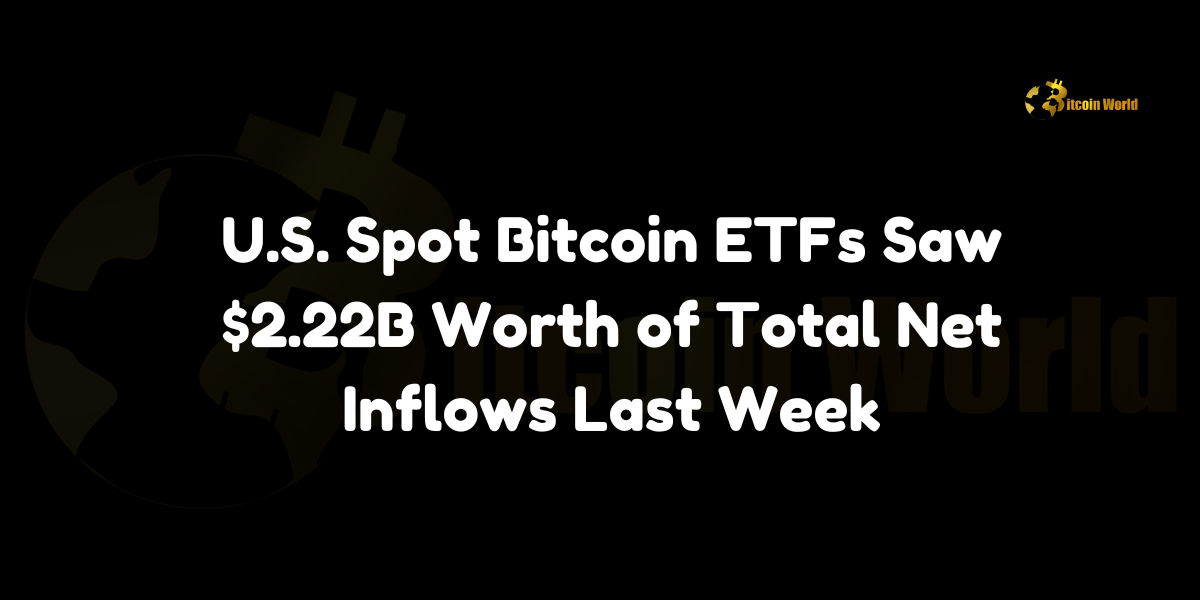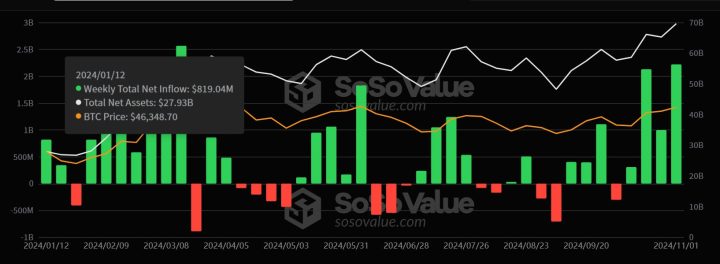Crptocurrency
U.S. Spot Bitcoin ETFs Saw $2.22B Worth of Total Net Inflows Last Week

U.S. Spot Bitcoin ETFs Saw $2.22B Worth of Total Net Inflows Last Week
In a remarkable display of investor confidence, U.S. spot Bitcoin Exchange-Traded Funds (ETFs) experienced a combined net inflow of $2.22 billion last week. According to data from SoSoValue, as highlighted in an X post by Wu Blockchain, this influx marks the third largest weekly net inflow in the history of Bitcoin ETFs. A significant portion of this surge is attributed to BlackRock’s IBIT, which alone recorded $2.15 billion in total net inflows during the same period.

Introduction to Bitcoin ETFs
What Are Bitcoin ETFs?
Bitcoin Exchange-Traded Funds (ETFs) are financial instruments that allow investors to gain exposure to Bitcoin without directly owning the cryptocurrency. These ETFs track the price of Bitcoin, enabling investors to buy shares that represent a fractional ownership of the underlying asset. Bitcoin ETFs provide a regulated and convenient way for institutional and retail investors to participate in the cryptocurrency market.
Importance of ETFs in the Crypto Market
ETFs play a crucial role in the mainstream adoption of cryptocurrencies by offering a familiar investment vehicle for traditional investors. They enhance liquidity, provide regulatory oversight, and reduce the barriers to entry for those interested in investing in digital assets like Bitcoin.
Detailed Analysis of the Net Inflows
Breakdown of the $2.22 Billion Inflow
The recent $2.22 billion net inflow into U.S. spot Bitcoin ETFs is a testament to the growing investor appetite for regulated crypto investment products. This influx is driven by several factors:
- Institutional Adoption: Increased participation from institutional investors seeking exposure to Bitcoin through regulated channels.
- Market Sentiment: Positive market trends and bullish sentiment towards Bitcoin have encouraged more investments.
- Product Availability: The availability of more Bitcoin ETF options provides investors with diverse choices to suit their investment strategies.
BlackRock’s Dominance with IBIT
Of the total inflows, BlackRock’s IBIT accounted for a staggering $2.15 billion, making it the primary driver of this surge. BlackRock, being one of the largest asset management firms globally, brings significant credibility and investor trust to the Bitcoin ETF space. The success of IBIT highlights the firm’s influential role in shaping the cryptocurrency investment landscape.
Historical Context of Bitcoin ETF Inflows
Comparison with Previous Inflows
The $2.22 billion inflow marks the third largest weekly net inflow in the history of Bitcoin ETFs. To put this into perspective:
- Historical Peak Inflows: The largest inflows occurred during major market rallies when Bitcoin prices surged.
- Recent Trends: The consistent inflow over recent weeks indicates sustained interest rather than a one-off spike.
Significance of Reaching the Third Largest Inflow
Achieving the third largest weekly inflow signifies a strong and growing endorsement of Bitcoin ETFs among investors. It reflects the increasing acceptance and integration of Bitcoin into traditional financial portfolios, paving the way for further mainstream adoption.
Implications for the Cryptocurrency Market
Enhanced Liquidity and Market Stability
The substantial inflows into Bitcoin ETFs enhance liquidity in the cryptocurrency market. Increased liquidity can lead to more stable price movements, reducing the volatility that is often associated with Bitcoin.
Increased Institutional Participation
The dominance of BlackRock’s IBIT in driving the inflows suggests a significant rise in institutional participation. Institutions bring large capital pools and sophisticated investment strategies, which can contribute to the maturation and stabilization of the crypto market.
Price Impact on Bitcoin
While ETFs themselves do not directly affect Bitcoin’s price, the underlying increased demand from ETF investments can exert upward pressure on Bitcoin prices. As more investors buy into Bitcoin ETFs, the demand for Bitcoin as an asset increases, potentially driving its price higher.
Expert Opinions on Bitcoin ETFs
Dr. Emily Carter, Blockchain Analyst
“The surge in Bitcoin ETF inflows, particularly driven by BlackRock’s IBIT, underscores the growing acceptance of Bitcoin in mainstream finance. ETFs offer a regulated and convenient way for institutional and retail investors to participate in the crypto market, which can lead to sustained growth and stability.”
Mark Thompson, Financial Strategist
“BlackRock’s significant role in the Bitcoin ETF space highlights the importance of institutional backing in legitimizing cryptocurrency investments. The recent inflows reflect a positive market sentiment and the increasing confidence of investors in regulated crypto products.”
Sarah Lee, Cryptocurrency Researcher
“The third largest weekly inflow into Bitcoin ETFs is a milestone that indicates the maturation of the cryptocurrency market. As more ETFs enter the market and attract substantial investments, we can expect further integration of digital assets into traditional financial systems.”
Future Outlook for Bitcoin ETFs
Continued Growth and Adoption
The trend of increasing inflows into Bitcoin ETFs is expected to continue as more investors seek exposure to Bitcoin through regulated channels. The launch of new ETFs and the entry of more asset management firms can further boost inflows.
Potential Regulatory Developments
As Bitcoin ETFs gain popularity, regulatory bodies may introduce more comprehensive frameworks to govern their operation. Enhanced regulatory clarity can attract more investors by ensuring the safety and integrity of ETF investments.
Impact of Market Dynamics
The performance of Bitcoin ETFs will continue to be influenced by broader market dynamics, including Bitcoin’s price movements, macroeconomic factors, and investor sentiment. Positive trends in Bitcoin’s value can lead to increased ETF investments, while market downturns may result in outflows.
Conclusion
The $2.22 billion net inflow into U.S. spot Bitcoin ETFs last week, predominantly driven by BlackRock’s IBIT, marks a significant milestone in the cryptocurrency investment landscape. This surge not only reflects the growing investor confidence in Bitcoin but also signifies the increasing integration of digital assets into mainstream financial portfolios. As Bitcoin ETFs continue to attract substantial investments, they play a pivotal role in enhancing liquidity, stabilizing the market, and fostering broader adoption of cryptocurrencies.
To stay updated on the latest developments in cryptocurrency investments and market trends, explore our article on latest news, where we cover significant events and their impact on the digital asset ecosystem.
Disclaimer: The information provided is not trading advice, Bitcoinworld.co.in holds no liability for any investments made based on the information provided on this page. We strongly recommend independent research and/or consultation with a qualified professional before making any investment decisions.
Crptocurrency
BTC/Gold Index Sees Biggest Single-Day Surge Since 2022 Following Trump’s Election Win

Crptocurrency
Rekt Raises $1.5M Seed Round Backed by Angels and Community, Following Sell-Out Success of Rekt Drinks

Crptocurrency
JP Morgan Analysts Expect Bitcoin and Gold Gains Under Trump Presidency

JP Morgan Analysts Expect Bitcoin and Gold Gains Under Trump Presidency
JP Morgan analysts, led by Nikolaos Panigirtzoglou, foresee a strong bullish outlook for gold and Bitcoin under President-elect Donald Trump’s administration, driven by what they term a “debasement trade” strategy. This approach aims to profit from anticipated currency devaluation and inflationary pressures, which typically benefit assets viewed as stable stores of value, including gold and Bitcoin. JP Morgan’s analysis suggests that continued demand for exchange-traded funds (ETFs), geopolitical uncertainties, and major Bitcoin acquisitions by companies like MicroStrategy will support this trend through 2025.
Key Drivers Behind JP Morgan’s Bullish Prediction
Several factors underpin JP Morgan’s expectation of gains for Bitcoin and gold in the upcoming years:
- Debasement Trade Strategy: The “debasement trade” benefits from policies that lead to currency devaluation, particularly during periods of expansionary fiscal policies. As the U.S. dollar loses value, investors often turn to hard assets like gold and Bitcoin to preserve purchasing power, positioning them as attractive hedges.
- Geopolitical Tensions and Trade Policies: Trump’s stance on trade tariffs and the possibility of increased geopolitical tensions could lead to further dollar devaluation, adding to the appeal of Bitcoin and gold as alternative assets.
- Rising Demand for Gold and Bitcoin ETFs: The analysts note significant demand for Bitcoin and gold ETFs since mid-2023, driven largely by retail investors. As institutional interest grows, these ETFs provide an accessible means of exposure, bringing fresh capital to both assets.
- MicroStrategy’s Bitcoin Acquisition Plans: MicroStrategy, a major corporate holder of Bitcoin, has announced plans to increase its holdings. This institutional investment, combined with favorable economic conditions, is expected to create upward pressure on Bitcoin’s price, signaling confidence among large-scale investors.
The Role of Gold and Bitcoin as Inflation Hedges
Both gold and Bitcoin are widely recognized as stores of value that can serve as inflation hedges. In periods of high inflation or economic uncertainty, investors tend to favor assets that are not directly tied to fiat currencies, making gold and Bitcoin particularly attractive. Here’s how each asset fulfills this role:
- Gold: Historically, gold has been a go-to asset during periods of inflation and currency devaluation. Its tangible, finite supply makes it a safe haven in times of economic instability, offering stability when other assets might be declining in value.
- Bitcoin: While relatively new, Bitcoin’s limited supply of 21 million coins positions it as a “digital gold” with deflationary characteristics. Investors increasingly view Bitcoin as an inflation hedge, especially as regulatory clarity and institutional interest grow.
How Trump’s Economic Policies Could Boost Gold and Bitcoin
Under Trump’s administration, certain economic policies could amplify demand for Bitcoin and gold. Here’s what JP Morgan analysts highlight as key areas of influence:
- Expansionary Fiscal Policies: Trump’s prior administration implemented tax cuts and expansionary measures that drove economic growth but also increased federal debt. If similar policies are enacted, they could result in inflationary pressures, driving up demand for assets like gold and Bitcoin as stores of value.
- Increased Tariffs and Geopolitical Uncertainty: Trade policies, particularly tariffs, can lead to currency instability. Bitcoin and gold could benefit as investors seek out assets with less exposure to fiat currency fluctuations and trade uncertainties.
- Support for Financial Innovation: Trump has previously expressed interest in fostering innovation within the financial sector, which may include support for cryptocurrency regulation. A regulatory environment that favors digital assets could encourage institutional investment, further supporting Bitcoin’s price growth.
Growing ETF Demand Signals Institutional Interest
The report also highlights the impact of ETF demand on Bitcoin and gold prices. The introduction of ETFs for both assets has allowed a broader range of investors to participate in these markets, bringing liquidity and stability. Key points include:
- Retail Investor Demand: Since mid-2023, retail interest in ETFs has surged, particularly for Bitcoin ETFs. These products provide convenient and regulated access to Bitcoin, fueling demand and adding stability to its market.
- Institutional Adoption of Bitcoin ETFs: With major players like BlackRock and Fidelity entering the Bitcoin ETF market, institutional adoption is likely to increase, encouraging further investments. ETFs lower the entry barrier for large investors and hedge funds, contributing to Bitcoin’s mainstream acceptance.
MicroStrategy’s Bitcoin Strategy and Institutional Confidence
MicroStrategy has been one of the most vocal institutional supporters of Bitcoin, holding significant amounts of BTC on its balance sheet. The company’s plans for continued Bitcoin acquisitions reflect a broader trend of institutional confidence in Bitcoin as an asset class:
- Corporate Bitcoin Holdings: By increasing its Bitcoin reserves, MicroStrategy is signaling confidence in Bitcoin’s long-term value, potentially inspiring other companies to follow suit. This institutional buy-in could stabilize Bitcoin’s price and encourage broader adoption.
- Market Influence: MicroStrategy’s Bitcoin holdings influence market sentiment, as its public commitment to Bitcoin boosts investor confidence and supports a long-term bullish outlook.
Risks to JP Morgan’s Prediction
While JP Morgan’s outlook is optimistic, analysts have identified potential risks that could impact Bitcoin and gold’s performance:
- Regulatory Changes: Shifts in U.S. regulatory policy, particularly around digital assets, could introduce volatility to Bitcoin’s price. Strict regulations could dampen institutional participation and ETF demand, slowing Bitcoin’s growth.
- Economic Policy Reversals: If Trump’s administration implements policies that strengthen the dollar, such as reducing tariffs or prioritizing economic stability, the demand for Bitcoin and gold as inflation hedges may decrease.
- Market Volatility: Bitcoin’s inherent volatility remains a consideration for investors. Market corrections could impact short-term performance, even with strong long-term fundamentals.
Conclusion
JP Morgan’s analysis underscores a favorable outlook for Bitcoin and gold under Trump’s presidency, with expectations that inflationary policies, rising ETF demand, and strategic acquisitions by firms like MicroStrategy will drive these assets’ growth. The “debasement trade” strategy, geared toward profiting from currency devaluation, supports this trend by encouraging investment in assets seen as stores of value during economic uncertainty.
If these factors align, Bitcoin and gold could experience significant gains in the coming years, with Bitcoin’s expanding role as a digital store of value potentially setting new price benchmarks. For investors, this forecast highlights the strategic value of these assets within a diversified portfolio, particularly as the economy navigates potential inflation and currency pressures.
For further insights on Bitcoin, gold, and inflationary trends, explore our latest market analysis on investment strategies and asset performance under shifting economic policies.
Disclaimer: The information provided is not trading advice, Bitcoinworld.co.in holds no liability for any investments made based on the information provided on this page. We strongly recommend independent research and/or consultation with a qualified professional before making any investment decisions.
-

 Startup Stories1 year ago
Startup Stories1 year agoWhy Millennials, GenZs Are Riding The Investment Tech Wave In India
-

 Startup Stories1 year ago
Startup Stories1 year agoStartups That Caught Our Eyes In September 2023
-

 Startup Stories1 year ago
Startup Stories1 year agoHow Raaho Is Using Tech To Transform India’s Fragmented Commercial Trucking
-

 Startup Stories12 months ago
Startup Stories12 months agoMeet The 10 Indian Startup Gems In The Indian Jewellery Industry’s Crown
-

 Crptocurrency8 months ago
Crptocurrency8 months agoLither is Making Crypto Safe, Fun, and Profitable for Everyone!
-

 Startup Stories1 year ago
Startup Stories1 year agoHow Volt Money Is Unlocking The Value Of Mutual Funds With Secured Lending
-

 Startup Stories1 year ago
Startup Stories1 year agoWhy Moscow-Based Kladana Considers Indian SME Sector As The Next Big Market For Cloud Computing
-

 E-commerce1 year ago
E-commerce1 year agoTop Online Couponing Trends To Watch Out For In 2016




